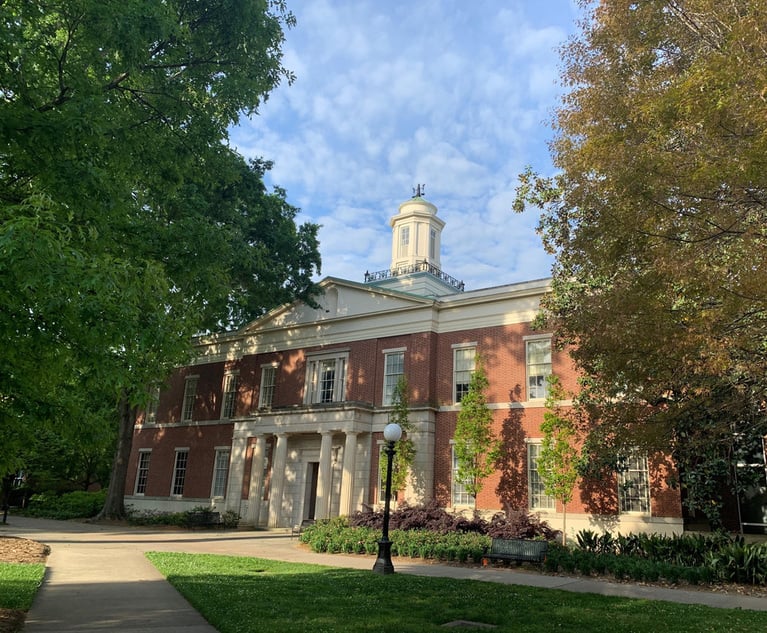'Step Back And Get a Plan': Midsize Firms Compare Challenges at Conference
Firm leaders discussed associate retention, succession planning and business development ideas.
October 31, 2019 at 01:43 PM
5 minute read
 Panelists at the Legal Network Alliance conference in Atlanta included, from left, John Monroe of Cleveland's Mansour Gavin, Bill Acevedo of Oakland's Wendel Rosen, and David Taub of Toronto's Robins Appelby. John Remsen Jr. of The Remsen Group in Atlanta was a moderator. (Courtesy photo: Scott Schulten)
Panelists at the Legal Network Alliance conference in Atlanta included, from left, John Monroe of Cleveland's Mansour Gavin, Bill Acevedo of Oakland's Wendel Rosen, and David Taub of Toronto's Robins Appelby. John Remsen Jr. of The Remsen Group in Atlanta was a moderator. (Courtesy photo: Scott Schulten)
The website for the Legal Netlink Alliance, an association of dozens of midsize law firms around the world, promises that member firms enjoy client referrals, legal resources and personal relationships that lead to "a deep appreciation for the global commitment of the legal profession to the Rule of Law."
The group dove into more nuts-and-bolts issues surrounding the business challenges of running a law firm, as seen during a recent conference at the Capital City Club in Atlanta. In one session, lawyers from three member firms—one from Oakland, California, one from Cleveland, Ohio, and one from Toronto—relayed their experiences around strategic planning.
The alliance features one firm per area, and its Atlanta representative is 18-lawyer Schulten Ward Turner & Weiss.
The moderator, Atlanta law firm consultant John Remsen Jr., teed up the discussion with observations about the difficulty of managing law firms. He was armed with many statistics, some pointing to paradoxical thinking by law firm leaders.
One study, he said, showed that leaders' top concern is retaining young lawyers, but another study showed that leaders' top priority was increasing productivity.
Other studies showed a majority of firms not performing client satisfaction surveys or employee satisfaction surveys, Remsen noted.
He reserved particular criticism for "too much democracy in many firms," where, "all it takes is one senior partner to stop an initiative."
"It's not a leader's job to make everyone happy," Remsen asserted.
One lawyer in the audience pointed out an issue that seemed to resonate—the loss of associates who have been with their firms since law school. One departing associate reportedly said of big firms, "They just like to pick them off from midsize firms."
Remsen acknowledged the problem and said work-life balance and other aspects of midsize practices can entice some lawyers to stay. "Those people are out there," he said, adding that exit interviews can glean a lot of helpful information.
Remsen then turned to the panelists, Bill Acevedo of Oakland's Wendel Rosen (67 lawyers); John Monroe of Cleveland's Mansour Gavin (23 lawyers) and David Taub of Toronto's Robins Appleby (28 lawyers.)
Acevedo, who handles transactional, regulatory, litigation and green business issues, said his 110-year-old firm "is at an inflection point."
He recalled a meeting in which partners were asked how long they expected to practice before retirement. "The numbers were startling," he said—that is, too many were in the twilight of their careers—and a strategic planning committee was formed.
Acevdeo said he was dubious, but the results have proven him wrong. One aspect involved interviews with 30 firm clients, done by two lawyers each, neither of which was the client's relationship partner. Good news came from these, he said: "Our clients really, really liked us."
Acevedo said a firm retreat was helpful too, noting sessions led by associates "brought a lot of thoughtful insights."
Support staff at the firm, he said, took surveys and were looking to the partners to assure them that they were ready for the retirements. "They wanted to know we had a plan," he said.
Changes included shortening the firm name and overhauling its logo to one that looked better on social media, he said.
Mansour Gavin's Monroe, who works on real estate and land use issues, said his partners worked on succession issues, given six of its 23 lawyers are over 68 years old.
It also worked on increasing revenue diversity after deciding billings from two clients took up a larger share than they were comfortable with.
One method they chose was to break the firms into accountability groups, in which four lawyers meet every quarter to compare notes on how much of their individual business plans they accomplished.
Showing that firms need a balance between business development and productivity, Taub, a business litigator at Robins Appleby, recalled that his firm at one point had too many lawyers wanting to go market their services and not enough wanting to do the billable work.
More broadly, he said, as the firm faced succession issues, partners had to figure out "who we are and who do we want to be," he said.
"Nothing changes unless you step back and get a plan," he added.
This content has been archived. It is available through our partners, LexisNexis® and Bloomberg Law.
To view this content, please continue to their sites.
Not a Lexis Subscriber?
Subscribe Now
Not a Bloomberg Law Subscriber?
Subscribe Now
NOT FOR REPRINT
© 2025 ALM Global, LLC, All Rights Reserved. Request academic re-use from www.copyright.com. All other uses, submit a request to [email protected]. For more information visit Asset & Logo Licensing.
You Might Like
View All
On The Move: Squire Patton Boggs, Akerman Among Four Firms Adding Atlanta Partners
7 minute read

Georgia Justices Urged to Revive Malpractice Suit Against Retired Barnes & Thornburg Atty
4 minute read
Trending Stories
- 1Parties’ Reservation of Rights Defeats Attempt to Enforce Settlement in Principle
- 2ACC CLO Survey Waves Warning Flags for Boards
- 3States Accuse Trump of Thwarting Court's Funding Restoration Order
- 4Microsoft Becomes Latest Tech Company to Face Claims of Stealing Marketing Commissions From Influencers
- 5Coral Gables Attorney Busted for Stalking Lawyer
Who Got The Work
J. Brugh Lower of Gibbons has entered an appearance for industrial equipment supplier Devco Corporation in a pending trademark infringement lawsuit. The suit, accusing the defendant of selling knock-off Graco products, was filed Dec. 18 in New Jersey District Court by Rivkin Radler on behalf of Graco Inc. and Graco Minnesota. The case, assigned to U.S. District Judge Zahid N. Quraishi, is 3:24-cv-11294, Graco Inc. et al v. Devco Corporation.
Who Got The Work
Rebecca Maller-Stein and Kent A. Yalowitz of Arnold & Porter Kaye Scholer have entered their appearances for Hanaco Venture Capital and its executives, Lior Prosor and David Frankel, in a pending securities lawsuit. The action, filed on Dec. 24 in New York Southern District Court by Zell, Aron & Co. on behalf of Goldeneye Advisors, accuses the defendants of negligently and fraudulently managing the plaintiff's $1 million investment. The case, assigned to U.S. District Judge Vernon S. Broderick, is 1:24-cv-09918, Goldeneye Advisors, LLC v. Hanaco Venture Capital, Ltd. et al.
Who Got The Work
Attorneys from A&O Shearman has stepped in as defense counsel for Toronto-Dominion Bank and other defendants in a pending securities class action. The suit, filed Dec. 11 in New York Southern District Court by Bleichmar Fonti & Auld, accuses the defendants of concealing the bank's 'pervasive' deficiencies in regards to its compliance with the Bank Secrecy Act and the quality of its anti-money laundering controls. The case, assigned to U.S. District Judge Arun Subramanian, is 1:24-cv-09445, Gonzalez v. The Toronto-Dominion Bank et al.
Who Got The Work
Crown Castle International, a Pennsylvania company providing shared communications infrastructure, has turned to Luke D. Wolf of Gordon Rees Scully Mansukhani to fend off a pending breach-of-contract lawsuit. The court action, filed Nov. 25 in Michigan Eastern District Court by Hooper Hathaway PC on behalf of The Town Residences LLC, accuses Crown Castle of failing to transfer approximately $30,000 in utility payments from T-Mobile in breach of a roof-top lease and assignment agreement. The case, assigned to U.S. District Judge Susan K. Declercq, is 2:24-cv-13131, The Town Residences LLC v. T-Mobile US, Inc. et al.
Who Got The Work
Wilfred P. Coronato and Daniel M. Schwartz of McCarter & English have stepped in as defense counsel to Electrolux Home Products Inc. in a pending product liability lawsuit. The court action, filed Nov. 26 in New York Eastern District Court by Poulos Lopiccolo PC and Nagel Rice LLP on behalf of David Stern, alleges that the defendant's refrigerators’ drawers and shelving repeatedly break and fall apart within months after purchase. The case, assigned to U.S. District Judge Joan M. Azrack, is 2:24-cv-08204, Stern v. Electrolux Home Products, Inc.
Featured Firms
Law Offices of Gary Martin Hays & Associates, P.C.
(470) 294-1674
Law Offices of Mark E. Salomone
(857) 444-6468
Smith & Hassler
(713) 739-1250






